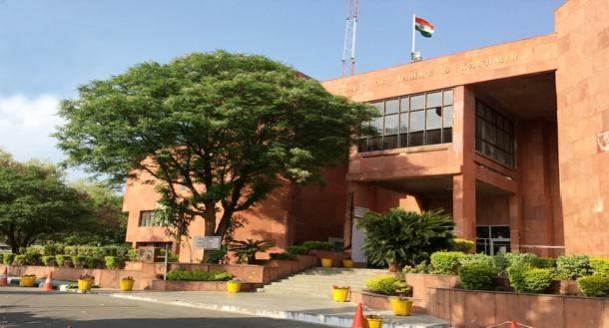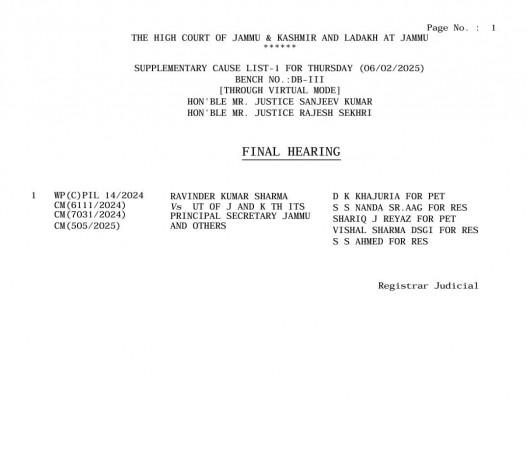
After receiving objections from both parties, the Jammu and Kashmir and Ladakh High Court has fixed February 6 as a day for the final hearing of the petition for the nomination of five Members of the Legislative Assembly (MLAs) in the Union Territory assembly.
The petition, filed by ex-MLC and chief spokesperson of Jammu and Kashmir Pradesh Congress Committee (JKPCC) Ravinder Sharma, challenged the nomination of these MLAs, citing concerns over the integrity of the electoral process.
Although the nomination of five MLAs is not going to pose any challenge to the stability of the Omar Abdullah government, this decision will play a very important role in the election of four Rajya Sabha members from Jammu and Kashmir.
"Final hearing of the case will be on Thursday", Ravinder Sharma, who filed the petition, told The International Bussiness Times.
In October 2024, the Jammu and Kashmir High Court has constituted a special division bench to hear the public interest litigation (PIL) filed by Ravinder Sharma with regard to the nomination of the five MLAs to the Legislative Assembly of the Union territory.
On October 14, 2024, the Supreme Court refused to entertain the plea and asked the petitioner to approach the high court.

As Sharma's counsel D K Khajuria moved the high court and sought early listing of the petition, Chief Justice Tashi Rabstan agreed to constitute a special bench to hear the matter.
On December 5, 2025, the High Court granted further time to the Jammu and Kashmir Government to file objections to the plea challenging the power vested with the Lieutenant Governor to nominate five members to the J&K Legislative Assembly.
The court has already opined that the writ petition, inter-alia, raises the following debatable question of law:
"Whether Sections 15, 15-A, and 15-B of the Jammu & Kashmir Reorganization Act, 2019, making provision for nominating the members of Legislative Assembly over and above the sanctioned strength of the Legislative Assembly, and which have the potential of converting the minority Government into a majority Government and vice versa, is ultra vires the Constitution being in violation of the basic structure of the Constitution?"
The petition challenged the provisions of the J&K Reorganisation Act, empowering the LG to make nominations of five MLAs.
The petition contended that the LG is supposed to seek the aid and advice of the Council of Ministers before making nominations, otherwise, the provisions are ultra-vires to the basic spirit and structure of the Constitution, Sharma said.
In the recently concluded Assembly elections, the National Conference-Congress alliance got a majority with 48 seats in the 90-member Assembly.
Petition challenged LG's power to nominate five MLAs
The petition challenged the provisions of the J&K Reorganisation Act, empowering the Lieutenant Governor of Jammu and Kashmir to make nominations of five MLAs.
The petition contended that the Lieutenant Governor is supposed to seek the aid and advice of the council of ministers before making nominations, otherwise, the provisions are ultra-vires to the basic spirit and structure of the Constitution, Ravinder Sharma said
As per the Jammu and Kashmir Reorganization Act 2019, the Lieutenant Governor will nominate five MLAs in the Legislative Assembly. Two women will be nominated as per Part III of Section 15 of the Jammu and Kashmir Reorganization Act 2019.
Two representatives will be nominated from the Kashmir migrants and one from the displaced Persons of Pakistan-occupied Jammu and Kashmir.
Provision to nominate two members from the Kashmiri Migrants and one from displaced persons from PoJK was made under the Jammu and Kashmir Reorganization (Amendment) Act 2023.
The Lieutenant Governor of the Union territory of Jammu and Kashmir may nominate not more than two members, one of whom shall be a woman, from the community of Kashmiri Migrants to the Jammu and Kashmir Legislative Assembly.
Explanation.—For the purposes of this section, the term "Migrant" shall have the same meaning as assigned to it in clause (e) of section 2 of the Jammu and Kashmir Migrant Immovable Property (Preservation, Protection and Restraint on Distress Sales) Act, 1997.
Displaced Person from Pakistan-occupied Jammu and Kashmir means any person, who, on account of the setting up of the dominions of India and Pakistan, or on account of civil disturbances or fear of such disturbances in any area of the then State of Jammu and Kashmir presently under the occupation of Pakistan, during the years 1947-48, 1965 and 1971, had left or had been displaced due to such disturbances from his place of residence in such area and who has been subsequently residing outside such area and also includes successors-in-interest of any such person"

















